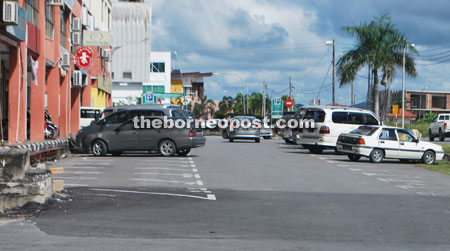
An undulating road in Pahlawan, Sibu.
SIBU: University College of Technology Sarawak (UCTS) will launch Peat Technology Research Institute (Petri) on Dec 1 with big dreams of producing new technology, materials and construction methods to improve infrastructure development on peat soil.
Works Minister Datuk Fadillah Yusof is slated to launch the institute at the campus here.
UCTS deputy vice chancellor (Academic) Professor Dato Dr Sabarudin Mohd is optimistic that Petri would play a central role in providing technical and scientific knowledge for sustainable development on peat soil, especially in Sarawak.
There are a total of 2.6 million hectares of peat lands across the country, of which about five per cent are in Sabah, 13 per cent in Peninsular Malaysia, and the rest in Sarawak.
Acknowledging that infrastructure development on peat was a challenging problem, Sabarudin said the institute hoped to at least minimise the problems and reduce construction costs.
He told The Borneo Post yesterday that he hoped research would start by this year-end.
“Our aim is to seek new technology, new materials, and then new methods of construction to minimise the problems in order to reduce construction costs.
“If you look at Sibu, it has about 550,000 sq km of peat land.
“Therefore, it is judicious to set up a research institute to develop soil investigation work, in-situ testing, sampling, and laboratory testing to study the characterisations of basic, physical, engineering and chemical properties, mineralogy and morphology of peat land.
“Our focus is more on engineering and technology so that we can ready peat land for infrastructure, housing, and roads.”
Sabarudin said Petri shall eventually also be able to provide expertise and human capital requirement to facilitate infrastructure development in the country, especially in Sarawak.
Among others, the institute also aimed to become a centre of excellence, providing research opportunity, expert advice, consultancy services, and technology advancement.
Meanwhile, the School of Engineering and Technology of UCTS has identified Geotechnical and Geo-environment as one of its niche research areas, focusing on the sustainable peat lands development.
To facilitate this initiative, the school plans to collaborate with Research Centre for Soft Soils (Recess), Universiti Tun Hussein Onn Malaysia (UTHM).
A memorandum of Understanding (MOU) has been signed between UTHM and UCTS to formalise this effort.
Besides UTHM, the school is also working closely with the state Public Works Department and Construction Industry Development Board (CIDB).
Sabarudin said in conjunction with the launching of the new institute, the university would hold a seminar on current issues of peat land technology, and opportunities and challenges, especially on the construction on that day itself.
Speakers from various parts of the country had been invited to deliver their talks, he said.
|